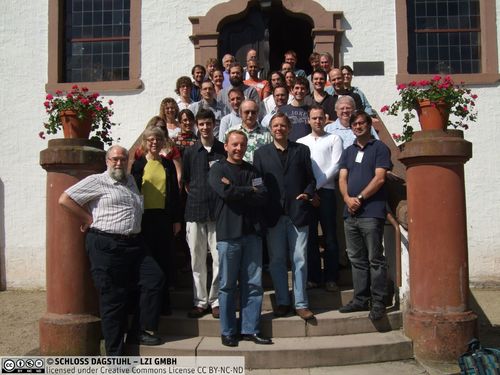Dagstuhl-Seminar 11351
Computer Science and Problem Solving: New Foundations
( 28. Aug – 02. Sep, 2011 )
Permalink
Organisatoren
- Georg Gottlob (University of Oxford, GB)
- Yll Haxhimusa (TU Wien, AT)
- Zygmunt Pizlo (Purdue University - West Lafayette, US)
- Iris van Rooij (Radboud University Nijmegen, NL)
Kontakt
- Susanne Bach-Bernhard (für administrative Fragen)
Programm
This Dagstuhl seminar brought together a group of computer scientists and psychologists to discuss their perspectives on problem solving. The seminar was inspired by two previous Problem Solving workshops in 2005 and 2008 at Purdue University, USA. These workshops, organized primarily by psychologists, laid bare some fundamental theoretical questions in problem solving research. The organizers believed that research on these questions could benefit from more involvement of computer scientists in the area of problem solving. This motivated the organization on this seminar, which aimed to bring together computer scientists and psychologists to help build new formal foundations for problem solving research.
Of the 36 participants at the seminar about half were computer scientists and the other half were psychologists, though many identified as interdisciplinary researchers (e.g., cognitive scientists). To facilitate cross-disciplinary perspectives, computer science and psychology talks were alternated in the program of the seminar. There were 7 longer featured talks and 15 shorter talks.
To conclude, the seminar was successful in several ways: (1) It has resulted in a renewed awareness of how computer science and psychology can complement each other in the study of problem solving; (2) it has created a new impetus for more involvement of computer scientists in contemporary problem solving research; (3) it has created more common ground between computer science and psychologist in the study of problem solving; (4) it has produced several novel ideas on how to conceptualize `problem solving' and, in particular, `problem solving by insight;' (5) it has produced several novel ideas on how to formalize these new conceptualizations; (6) it has produced concrete suggestions for new experimental paradigms for studying problem solving in the lab; (7) it has inspired new cross-disciplinary collaborative research projects; and last but not least (8) it has provided the groundwork on which follow-up Dagstuhl seminars can build in the future. With this seminar, the organizers hope to have contributed to an increased and sustained collaborative research effort between computer science and psychology in the domain of problem solving.
- William H. Batchelder (University of California - Irvine, US)
- Mark Blokpoel (Radboud University Nijmegen, NL)
- Sarah Carruthers (University of Victoria, CA) [dblp]
- Yun Chu (University of Hawaii at Manoa, US)
- Rina Dechter (University of California - Irvine, US) [dblp]
- Kenneth D. Forbus (Northwestern University - Evanston, US)
- Liane Gabora (University of British Columbia - Vancouver, CA) [dblp]
- Dedre Gentner (Northwestern University - Evanston, US)
- Noah D. Goodman (Stanford University, US) [dblp]
- Georg Gottlob (University of Oxford, GB) [dblp]
- Marcin Grzegorzek (Universität Siegen, DE)
- Yll Haxhimusa (TU Wien, AT) [dblp]
- Jens Hedrich (Universität Koblenz-Landau, DE) [dblp]
- Adrian Ion (TU Wien, AT)
- Frank Jäkel (Universität Osnabrück, DE) [dblp]
- Brendan Juba (MIT - Cambridge, US) [dblp]
- Markus Knauff (Universität Gießen, DE) [dblp]
- Walter Kropatsch (TU Wien, AT)
- Johan Kwisthout (Radboud University Nijmegen, NL) [dblp]
- David Landy (University of Richmond, US) [dblp]
- Zoltan Miklos (EPFL - Lausanne, CH)
- Nysret Musliu (TU Wien, AT) [dblp]
- Zygmunt Pizlo (Purdue University - West Lafayette, US) [dblp]
- Marco Ragni (Universität Freiburg, DE) [dblp]
- Daniel Reichman (Weizmann Institute - Rehovot, IL)
- Ute Schmid (Universität Bamberg, DE) [dblp]
- Ulrike Stege (University of Victoria, CA) [dblp]
- Jakub Szymanik (University of Groningen, NL) [dblp]
- Niels A. Taatgen (University of Groningen, NL) [dblp]
- Susanne Tak (University of Canterbury - Christchurch, NZ)
- Jelle van Dijk (TU Eindhoven, NL)
- Iris van Rooij (Radboud University Nijmegen, NL) [dblp]
- Sashank Varma (University of Minnesota - Minneapolis, US) [dblp]
- Jered Vroon (Radboud University Nijmegen, NL)
- Todd Wareham (Memorial University of Newfoundland, CA) [dblp]
- Gerhard J. Woeginger (TU Eindhoven, NL) [dblp]
Verwandte Seminare
- Dagstuhl-Seminar 14341: Resource-bounded Problem Solving (2014-08-17 - 2014-08-22) (Details)
Klassifikation
- artificial intelligence
- robotics data intelligence
- algorithms
- complexity society
- human-computer interaction
- interdisciplinary
Schlagworte
- problem solving
- cognitive psychology
- cognitive systems
- vision
- representations
- computational complexity


